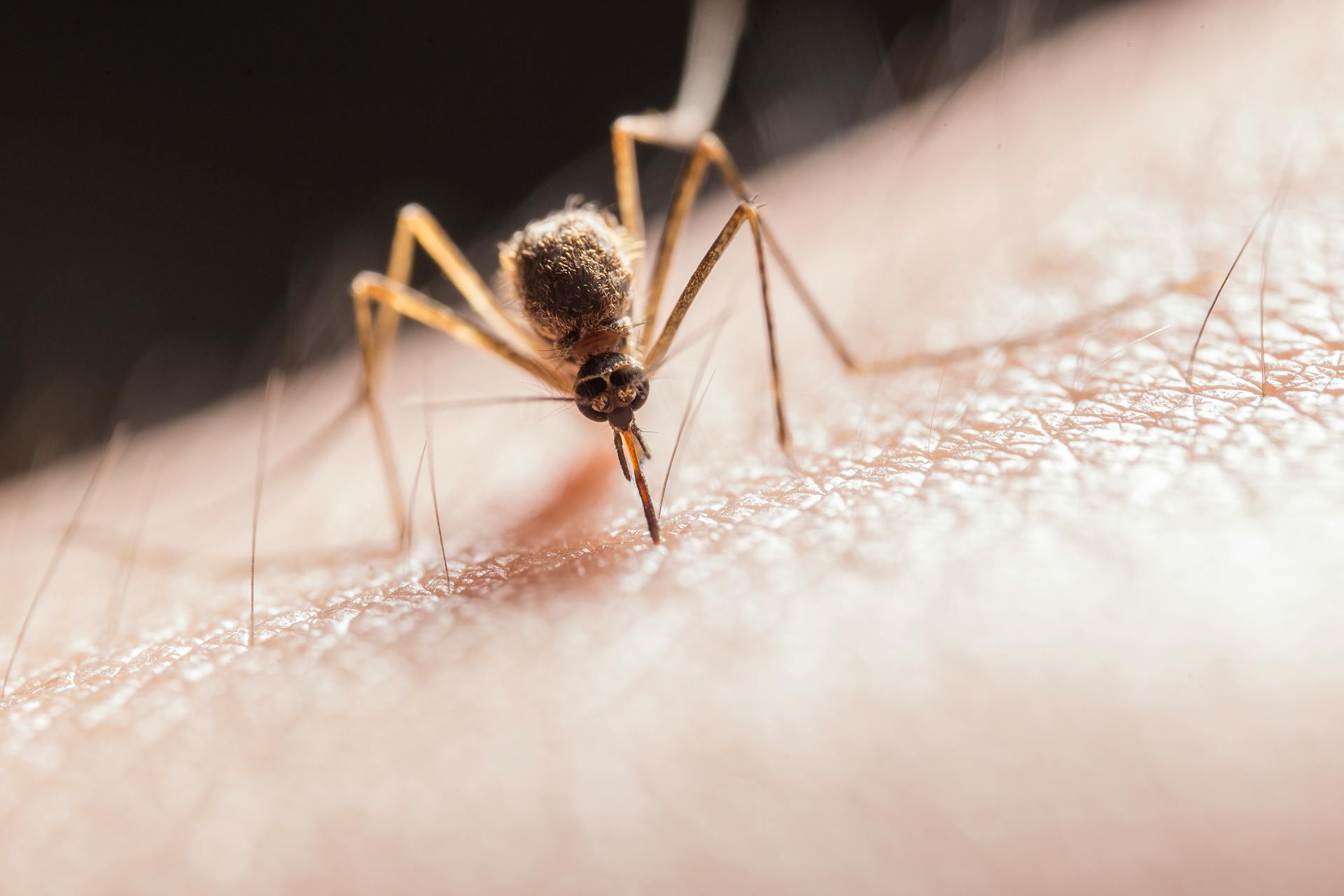
Miniature Poodles are intelligent and active dogs, but they can be prone to certain health issues if not properly cared for. They can be sensitive to temperature extremes, so it's essential to provide them with a comfortable living space.
Their coats require regular grooming to prevent matting and tangling, which can be painful for them. Regular brushing and trimming can help prevent these issues.
Some Miniature Poodles may experience eye problems, such as progressive retinal atrophy, which can lead to blindness. This condition is often inherited, so it's crucial to work with a reputable breeder who has had their dogs tested for this condition.
Regular veterinary check-ups can help identify any potential health issues early on, allowing for prompt treatment and prevention of more severe problems.
Curious to learn more? Check out: Miniature Poodles Good Apartment Dogs
Health Issues
Miniature Poodles are prone to several health issues that can impact their quality of life. Regular veterinary check-ups and genetic screenings can help prevent or delay the onset of certain conditions.
Common health issues in Miniature Poodles include Mitral Valve Disease, Addison's Disease, Dyschondroplasia, Legg-Calvé-Perthes disease, Hypothyroidism, Patellar Luxation, and eye problems such as Progressive Retinal Atrophy and Cataracts.
To manage these conditions, owners should be aware of the common signs and symptoms, such as heart murmurs, coughing, weight loss, vomiting, lameness, stiffness, difficulty moving, limping, and cloudy eyes. Early detection and proper care can lead to better outcomes and improved quality of life for Miniature Poodles.
Here are some common health issues in Miniature Poodles, along with their common signs and preventive measures:
Bone and Joint Issues
Bone and joint issues are a common concern for Miniature Poodle owners. Miniature Poodles are prone to a painful degenerative hip condition called Legg-Calve-Perthes Disease, which affects the blood supply to the hip and causes the femoral head to become brittle and easily fracture.
This condition usually occurs between six and nine months of age and causes pain and lameness in one or both rear legs. Surgery is often necessary to correct the issue.
Patellar luxation is another common condition that affects the kneecap, causing it to slip out of place. You might notice your Miniature Poodle running and then suddenly picking up a back leg and skipping or hopping for a few strides.
In mild cases, arthritis medication may be sufficient to manage the condition, but severe cases may require surgical intervention to realign the kneecap.
Hip dysplasia is a condition that affects the hip joint, causing the head of the femur to not properly align with the cup of the hip socket. This can range from mild to severe and can be diagnosed with an X-ray.
Here are some common signs of bone and joint issues in Miniature Poodles:
Regular veterinary check-ups and genetic screenings can help prevent or delay the onset of these conditions. Maintaining a healthy lifestyle with proper diet and exercise can also support overall well-being and stave off some diseases.
Eye Problems
Eye problems can be a significant concern for Miniature Poodles, and it's essential to be aware of the potential issues that can arise.
Progressive retinal atrophy (PRA) is a group of diseases that can cause blindness in Miniature Poodles. PRA is inherited, and in Toy and Miniature Poodles, one specific type of inherited PRA predominates.
The age of onset and rate of disease progression can vary among different breeds, within the same breed, and within the same litter. Diagnosis of PRA is typically made around 3 years of age, based on an eye exam by a veterinary ophthalmologist.
A DNA test is available to detect the genetic mutation that causes prcd-PRA in dogs. The disorder is inherited as a "simple recessive", meaning that affected dogs have two copies of the abnormal gene.
Cataracts are another hereditary condition that affects Miniature Poodles. Cloudy eyes are a telltale sign of cataracts, and affected dogs may bump into things and have issues navigating their environment, especially at night.
Check this out: Toy Poodles White
Cataracts can be corrected with surgery before the dog loses sight. Regular ophthalmic exams can help detect these conditions early on.
To maintain your Miniature Poodle's eye health, you should:
• Clip the hair around their eyes between grooming appointments to prevent hair from obstructing their vision.
• Have regular eye exams with a veterinary ophthalmologist, especially if you're a breeder.
• Consider genetic testing for prcd-PRA to identify affected or carrier dogs.
Here's a summary of common eye problems in Miniature Poodles:
Infections
Miniature Poodles are susceptible to bacterial and viral infections, including parvo, rabies, and distemper.
Many of these infections are preventable through vaccination, which we will recommend based on the diseases we see in our area, her age, and other factors.
Ear infections can occur if moisture becomes trapped in the ears, especially after baths and swimming sessions.
Cleaning the ears after these activities is crucial to keeping them dry and healthy.
Liver Issues
Miniature Poodles are prone to liver disorders, specifically portosystemic shunt (PSS), which affects the liver's ability to remove toxins from the bloodstream.
This condition can be detected through a liver function test, which is conducted every time your Miniature Poodle undergoes anesthesia.
If your dog has PSS, he may develop symptoms like stunted growth or seizures, which require immediate attention.
A special diet and medication can sometimes treat PSS, but in severe cases, surgery may be necessary.
Tracheal Collapse
Tracheal Collapse is a common health issue in Miniature Poodles. The trachea, or windpipe, is made up of rings of cartilage that provide flexibility and strength, but in some cases, these rings are weak or formed incorrectly.
In Miniature Poodles, the trachea can collapse and become too narrow, leading to coughing and difficulty breathing. This can be a serious issue, but most cases are mild and treated with medication.
The trachea's structure is similar to a vacuum cleaner's ridged hose, which can be a helpful way to imagine how it works. The rings of cartilage are what give the trachea its strength and flexibility.
Nutrition: Feeding Your
Miniature Poodles require a dog food approved by the Association of American Feed Control Officials (AAFCO) to ensure they receive the necessary nutrients.
Their food must be suitable for their current life stage, whether they're a puppy, adult, or senior.
You should consult with your veterinarian to determine the best food for your Miniature Poodle and to ensure they're getting the right nutrients.
Puppies need to eat three or four times a day, following a consistent schedule, until they reach their first birthday.
After their first birthday, you can reduce their meals to twice a day.
A balanced diet is crucial to keep your Miniature Poodle at its best, so it's essential to choose a dog food that aligns with AAFCO guidelines.
Your veterinarian can provide personalized recommendations based on your poodle's unique lifestyle, age, and health considerations.
Grooming and Hygiene
Regular grooming is essential for Miniature Poodles, as their curly coat is prone to matting without proper maintenance.
Their low-shedding coat requires regular haircuts, typically every 6-8 weeks, and daily brushing to prevent mats. You can also learn to groom them yourself or take them to a professional groomer.
Miniature Poodles need their teeth cleaned regularly to prevent dental disease, so brush their teeth at least three times a week. They also require regular nail trimming, ear cleaning, and eye care to prevent infections.
Here's a quick rundown of their grooming needs:
- Daily brushing to detangle and prevent mats
- Regular trimming to sustain coat health and prevent overgrowth
- Professional grooming every four to six weeks for an optimal coat condition
- Brush their teeth at least three times a week
- Trim their nails monthly
- Clean their ears weekly
- Clip the hair around their eyes between grooming appointments
By following these grooming and hygiene tips, you can help keep your Miniature Poodle happy, healthy, and looking their best.
Dental Disease
Dental disease is a common chronic problem in pets, affecting 80% of all dogs by age two. Miniature Poodles are particularly prone to dental issues.
Tartar build-up on the teeth is the first sign of dental disease, which can progress to infection of the gums and roots of the teeth if left untreated. Regular cleaning and monitoring are crucial to prevent this.
If dental disease is not prevented or treated, your Miniature Poodle may lose her teeth and be at risk of damaging her kidneys, liver, heart, and joints. This can even cut her life span short by one to three years.
Brushing your dog's teeth regularly is essential to keep them clean. You should brush your Miniature Poodle's teeth at least three times a week, and we'll also clean her teeth regularly.
Here are some tips for keeping your Miniature Poodle's teeth clean:
- Brush her teeth daily, paying special attention to the areas where the teeth and gums meet.
- Use a dog-specific toothbrush and toothpaste to avoid any adverse reactions.
- Start brushing your dog's teeth early, even as a puppy, to make it a regular part of her routine.
Parasites
Parasites can invade your Miniature Poodle's body, inside and out, through various means.
Fleas and ticks can infest her skin, while ear mites can target her ears. Hookworms, roundworms, heartworms, and whipworms can get into her system through contaminated water or soil, or by being bitten by an infected mosquito.
Drinking unclean water or walking on contaminated soil are common ways for your dog to pick up parasites. These parasites can cause pain, discomfort, and even death in your canine friend.
Some parasites can be transmitted to you or a family member, making them a serious concern for everyone. Regular testing and preventive medication can keep your dog healthy and prevent the spread of parasites.
If this caught your attention, see: Poodle Water Dog
Multiple Skin Issues
Your Miniature Poodle is prone to skin infections and diseases, including Malassezia dermatitis, which causes itching, redness, and a brown waxy discharge in the ears.
Malassezia dermatitis can also lead to greasy, hairless areas on the neck and throat, with a characteristic odor.
Seborrhea is another common skin disease that can cause dry, flaky skin or greasy, oily skin.
These skin problems can make your pet itchy and uncomfortable.
Bathing with special shampoos and rinses may help alleviate symptoms, and addressing underlying issues like allergies is also crucial.
The sooner you have your Miniature Poodle's skin problems checked, the less likely you'll end up caring for an itchy, bald, smelly dog.
A different take: Cavapoo Behavior Problems
Grooming Guide
Miniature Poodles need regular grooming to stay healthy, so you'll either need to book appointments with a professional groomer or learn how to use dog clippers yourself.
Their low-shedding coat requires regular haircuts, typically every 6-8 weeks. Daily brushing is also necessary to detangle and prevent mats.
Their teeth need to be brushed at least three times a week to prevent tartar and bacteria buildup, and dental cleanings should be scheduled as recommended by your vet.
Their nails should be trimmed monthly, as they can become overgrown if not monitored.
Miniature Poodles are prone to ear infections, so it's essential to keep their ears dry and clean, especially after baths and swimming sessions.
Here's a brief summary of their grooming needs:
- Brush their coat daily to prevent mats
- Trim their nails monthly
- Brush their teeth at least three times a week
- Clean their ears regularly
- Bathe them once a month with dog-friendly products
By following this grooming guide, you'll be able to maintain your Miniature Poodle's beautiful coat, prevent health issues, and strengthen your bond with your furry friend.
Personality and Temperament
Miniature Poodles are known for their friendly and playful personalities, making them great companions for children. They thrive on interaction and require lots of exercise and playtime to keep their sharp brains engaged.
Early socialization and training are crucial for Miniature Poodles to become confident pups, as they can become anxious in new situations. A predictable routine, positive reinforcement, and gentle play can help alleviate timidity and anxiety in these dogs.
To foster a confident and sociable Miniature Poodle, implement a predictable routine, incorporate positive reinforcement, and spend quality time through activities like gentle play and training. This will help your Miniature Poodle emerge as a confident and sociable member of the canine community.
Personality and Temperament
Miniature Poodles are known for their friendly and playful personalities, making them great companions for children. They thrive on attention and interaction, so be prepared to spend quality time with your Miniature Poodle.
They need lots of exercise and playtime to burn off energy and keep their sharp brain engaged. This can be as simple as a daily walk or playtime in the backyard.
Miniature Poodles can become anxious in new situations, so early socialization and training is crucial for having a confident pup. Consistency is key in helping your Miniature Poodle feel secure.
To help your Miniature Poodle feel safe, implement a predictable routine. This can include regular feeding times, playtime, and sleep schedules.
Here are some benefits of socialization for your Miniature Poodle:
- Introduces a friendly poodle demeanor that easily befriends humans and animals alike.
- Reduces poodle anxiety and unfamiliarity with varied daily experiences.
- Helps prevent behavioral issues by creating a well-rounded social palette.
By providing a stable and calm environment, you can help alleviate any timidity or anxiety your Miniature Poodle may exhibit. Positive reinforcement and gentle play can go a long way in building your Miniature Poodle's confidence.
Traits & History
The Miniature Poodle's history is steeped in nobility, with its origins tracing back to the French aristocracy. They were bred specifically as companions for the wealthy.
The breed's purpose was rooted in providing a posh and elegant companion, with their proud demeanors making them a favorite among the French aristocracy. This is evident in their long history as show dogs, hunting dogs, and home dogs.
The Miniature Poodle's lineage dates back to Germany, but it was in France that the breed was formally bred. The exact timeline is unknown, but it's believed to have originated in the 15th century.
Interestingly, the Miniature Poodle was not created by breeding Poodles with smaller dogs, but rather by mating runts with each other. This explains why there are three different types of dogs within the same breed: Standard Poodles, mid-sized Poodles, and Miniature Poodles.
A dog smaller than 11 inches is considered a Toy Poodle, and one even smaller is classified as a Teacup Poodle.
Recommended read: Standard Poodle Origin
Training and Exercise
Training your Miniature Poodle requires consistency and positive reinforcement. They're intelligent enough to pick up on everything, so it's essential to handle them properly at home and in obedience classes.
Miniature Poodles need early socialization to develop their personalities and not be aloof or aggressive towards other dogs or people. This is crucial to prevent any potential behavioral issues.
A daily walk is sufficient for exercise, but it should be brisk and quick to avoid tiring them out. You can also include play sessions in the yard or apartment to keep them active.
Positive reinforcement is the best tactic for home training and mitigating barking issues. Treats and praise are great incentives for good behavior.
Miniature Poodles are great swimmers and love the outdoors, but they do have a smaller exercise requirement due to their smaller size. A balanced and enriching exercise routine is key to a happy and healthy Miniature Poodle.
Here are some essential exercise components for your Miniature Poodle:
- Daily walks
- Structured playtime (e.g., fetch, tug-of-war)
- Agility training
- Mental exercises (e.g., puzzles, problem-solving)
Remember, consistency is key when training your Miniature Poodle. Regular, short, and fun training sessions will encourage learning and retention.
Here's an interesting read: Training a Poodle Standard
Care and Maintenance
Taking care of your miniature poodle at home is crucial for their happiness and health. Much of what you can do is common sense, just like it is for people. Watch her diet, make sure she gets plenty of exercise, regularly brush her teeth and coat, and call a pet emergency hospital when something seems unusual.
Regular brushing and grooming is needed every 6-8 weeks to keep her coat beautiful. Daily brushing and regular grooming is a must for your Miniature Poodle's overall well-being. Miniature Poodles often have serious problems with their teeth, so you'll need to brush them at least three times a week.
To keep your Miniature Poodle healthy and happy, it's essential to build her routine care into your schedule. Supervise your pet as you would a toddler, keep doors closed, pick up after yourself, and block off rooms as necessary. This will keep her out of trouble and away from objects she shouldn’t put in her mouth.
Here are some key aspects of care to focus on:
At Home Care

At Home Care is a crucial aspect of ensuring your Miniature Poodle lives a happy and healthy life. Regular care and attention will keep your dog happy and healthy.
To start, make sure to watch her diet and ensure she gets plenty of exercise. Regular brushing and grooming is also essential, with daily brushing and regular grooming sessions every 6-8 weeks to keep her coat beautiful. Brushing her teeth at least three times a week is also necessary to prevent serious problems with her teeth.
Clean her ears weekly, even as a puppy, to keep them healthy. Miniature Poodles are well suited to apartment life as long as they are given daily walks and frequent play sessions. They also love the water and swimming is a great form of exercise for your dog.
Consistency is key when it comes to your dog's diet. Feed a high-quality diet appropriate for her age and don't give her people food. Exercise your dog regularly, but don't overdo it at first.
Here are some key at-home care tasks to remember:
- Watch her diet
- Provide plenty of exercise
- Brush her teeth at least three times a week
- Clean her ears weekly
- Feed a high-quality diet appropriate for her age
- Exercise her regularly, but don't overdo it
Care and Maintenance

A Miniature Poodle's lifespan can range from 12-15 years, but with proper care, they can live up to 18 years old. Regular veterinary check-ups can help catch potential health issues early, allowing for more effective management.
Nutrition plays a significant role in a Miniature Poodle's overall health and longevity. Feeding a balanced diet designed for a small breed's needs contributes to overall health and longevity.
Exercise is crucial for keeping a Miniature Poodle fit and healthy. Regular physical activity helps ward off obesity-related issues.
Dental hygiene is also essential for a Miniature Poodle's overall health. Good oral care prevents periodontal disease, which can affect systemic health.
Mental stimulation is just as important as physical exercise for a Miniature Poodle's well-being. Keeping their active minds engaged can prevent stress and related health problems.
Here's a breakdown of the cornerstones of extending your Mini Poodle's life through preventive health care and wellness management:
Frequently Asked Questions
What are the disadvantages of a Poodle?
A Poodle requires regular grooming, exercise, and attention, making it a high-maintenance pet. If you're looking for a low-maintenance pet, a Poodle may not be the best fit.
What are the disadvantages of miniature Poodles?
Miniature Poodles are prone to chronic health issues such as allergies, heart problems, and joint disorders. Despite their long lifespan, they may not always be healthy, making regular veterinary care and monitoring crucial.
What is the life expectancy for a miniature poodle?
Miniature Poodles typically live for 12 to 15 years with proper care, and some may live even longer. With the right lifestyle and nutrition, they can enjoy a relatively long and healthy life.
Sources
- https://www.petmd.com/dog/breeds/miniature-poodle
- https://canna-pet.com/breed/miniature-poodle/
- https://www.articlesfactory.com/articles/animals-and-pets/miniature-poodle.html
- https://johnsoncreekveterinarycare.com/client-resources/breed-info/miniature-poodle/
- https://poodleclubofamerica.org/health-concerns/
Featured Images: pexels.com


